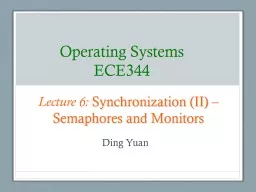PPT-Operating System Transactions
Author : trish-goza | Published Date : 2015-09-27
Donald E Porter Owen S Hofmann Christopher J Rossbach Alexander Benn and Emmett Witchel The University of Texas at Austin OS APIs dont handle concurrency 2
Presentation Embed Code
Download Presentation
Download Presentation The PPT/PDF document "Operating System Transactions" is the property of its rightful owner. Permission is granted to download and print the materials on this website for personal, non-commercial use only, and to display it on your personal computer provided you do not modify the materials and that you retain all copyright notices contained in the materials. By downloading content from our website, you accept the terms of this agreement.
Operating System Transactions: Transcript
Download Rules Of Document
"Operating System Transactions"The content belongs to its owner. You may download and print it for personal use, without modification, and keep all copyright notices. By downloading, you agree to these terms.
Related Documents














